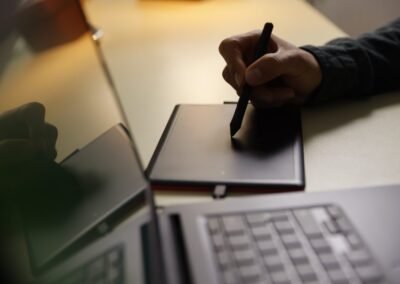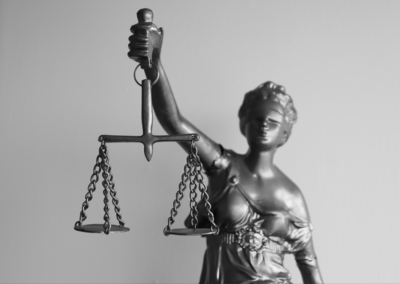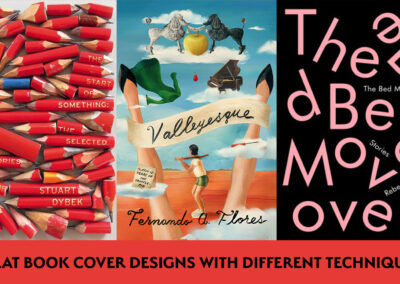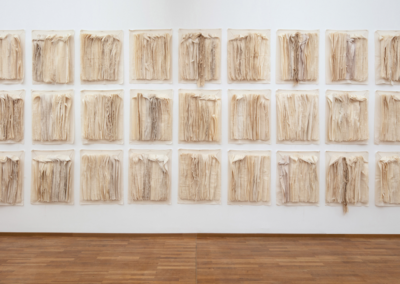In this next episode of the Let’s Talk Art series, we discuss Mark Reihill´s illustration career, work set-up, advice for aspiring artists, and more.
Mark has a freelance career spanning over a decade and before that worked at an agency. His instantly recognizable illustration style is fun, bold and dynamic.
So, Let’s Talk Art.
Your work spans across different mediums, genres, and clientele, from magazine covers to McVitie’s biscuit boxes. What is most beneficial about this?
Free stuff. Haha!
I think working on a wide range of projects across a variety of different media keeps my job interesting. No two projects are ever the same and that’s important as it keeps your work fresh and prevents it becoming too repetitive.
It’s always rewarding to see your artwork in the real world whether it’s on a magazine cover, billboard or on a tin of biscuits. It’s also nice to spend one-day drawing killer rabbits running amok in New York and the next designing characters to teach kids about road safety.
Like I say, no two days the same. The diversity of my projects allows me to draw-in (pun intended) the experiences and techniques from each job and apply them to others – even though the briefs/clients could be worlds apart. For example, I’ve used influences from cocktail menus I’ve illustrated and applied them to books on cycling.
You took part in the Star Trek 50th anniversary art show “Star Trek 50”. How did that come about and what did you want to convey in your piece?
I got an email from CBS saying I had been selected to take part in an exhibition to celebrate 50 years of Star Trek. Well, I almost fell out of my chair!
It wasn’t until later that I realized the final ’50’ had been hand-picked out of hundreds of artists from around the word – it was an absolute honour!

Star Trek 50 artists 50 years book to celebrating Star Trek’s 50th anniversary with Mark Reihill
The show “Star Trek: 50 Artists. 50 Years” celebrates Star Trek’s 50th anniversary with a year-long, global art exhibition. It was so humbling sharing an exhibition with so many artists that I admire, like Paul Shipper, Stanley Chow, Derek Charm – and of course Leonard Nimoy who had a photographic piece in the show.
As a huge, life-long Star Trek fan (I don’t want to use the term Trekkie) this was the perfect opportunity to dust off the DVDs and binge-watch some Star Trek for work.. for actual research! The brief was totally open, artists were allowed to illustrate anything from the TV shows, films, animated series etc.
As much as I love The Next Generation, Deep Space Nine and some of the movies, it’s The Original Series that really captivates me – the cast, stories, and special effects that are equal parts awesome and cheesy but very much ahead of their time. My favourite episode is ‘What Are Little Girls Made Of’ so of course, I went straight for that.
The process was pretty straightforward and CBS were amazing to deal with. I had to submit a rough sketch for approval (composition, a license of characters etc.) once passed I went straight to artwork, which I later submitted for final approval.
It’s surreal seeing my artwork on official Star Trek merchandise – books, mugs, posters, and art prints.
I was lucky enough to be in New York a few months ahead of the show and was invited into CBS HQ to sign the giclée prints. Later that year I attended the exhibition in the Paley Centre, New York, and ‘Destination Star Trek’ in the NEC, Birmingham, for signing and of course geeking out!

Mark Reihill signing prints of his Star Trek poster
You are the illustrator for The Dead Rabbit Grocery & Grog. How does it feel working for the “World’s Best Bar”? Their cocktail menus are unique too, can you tell us about that?
I really love working with The Dead Rabbit. Based in New York, it’s one of the most famous cocktail bars in the world and voted World’s Best Bar.
I illustrate pretty much everything for the bar – posters, prints, cocktail menus etc. It’s an incredible place and the owners are always pushing the boundaries creatively – which is great news for me as I get to draw some pretty amazing, intense, graphic and violent stuff!
The Dead Rabbit’s cocktail menus became world famous. Their menus weren’t just folded pages with a list of drinks down one side and some clipart on the other, oh no! These stunning leather-bound, foil embossed, stitched and bound, hardback ‘Mixed Drinks Menus’ completely changed the game.
After unleashing these juggernauts into the world (annually) and racking up a shelf full of accolades, where do you go? How can you possibly top that? Enter, the ‘Mixed Drinks Menu, 4th Edition’. A comic book menu…Let that sink in…The Dead Rabbit’s cocktail menu is a fully-illustrated comic book!

Dead Rabbit’s comic style cocktail menu with art by Mark Reihill
As you can imagine, the comics are so much fun to work on. Almost every character in the menu is a real person within the drinks industry – from brand ambassadors to cutting-edge bartenders.
That’s the joy and challenge of the project, to capture so many likenesses (each menu as around 20 cast members). The process is the same as before, once I read the script I send through a rough draft, and once approved the characters are cast and I go into the artwork stage.
The menus come out every six months I’m usually working on this project all year round, which is pretty awesome!

Mark’s illustrations inside the Dead Rabbit book
A lot of people know your work from the Starburst Magazine covers; you often get to draw some of the coolest pop culture characters. How did you get that opportunity?
I’m a huge film, game and sci-fi fan and had read Starburst Magazine in my youth.
A few years ago while at a newsagent, a magazine caught my eye. It was Starburst – with an illustrated cover! I thought it was very innovative of them to take an illustrated approach, rather than the traditional, photographic route.
I sent the editor an email basically saying how much I love the genres covered in the magazine along with examples of my artwork. His response was, “you are now the new Starburst cover artist”. Since then, I’ve illustrated 50+ covers.
Starburst is a great client. They usually send me a list of covers x6 months in advance and I produce one a month. In the beginning, I would send x3 rough concepts to the editor, he would choose one and I’d work it up.
Over time, I began to send x1 concept for approval. Now, I go straight to ‘artwork’. This is the result of having a good, long-term working relationship, where we both trust each other.

Various covers for Starburst magazine created by Mark Reihill
You used to work at an agency but you’ve now been freelance for about 12 years. What would you say is the scariest thing about dropping a 9-5 job?
Without a doubt my biggest fear was lack of income. It’s a huge risk to go out on your own, but I think you need that fear. It drives you and ultimately makes it damn near impossible to procrastinate. You have to work hard, or you won’t eat!
I was working in an advertising agency in Belfast, they were forced to downsize. I was the last employee in, so was one of the first out. Rather than apply to another agency, I used this opportunity to go freelance. I’ve always wanted to go out on my own but never had the guts. This ‘redundancy’ was exactly the push I needed.
I thought to myself, I’ll try it, and if it doesn’t work I can always get a job with another studio. I spent a few weeks showing my portfolio to advertising agencies, one job leads to another and here I am 12 years later.
It’s certainly a lot easier to get your work out there now than it was when I started, with the internet and social media, but if you can, I still think it’s great to go into studios and meet creative directors face to face.

Starburst magazine cover inspired by The Walking Dead by Mark Reihill
Your work has circulated the internet countless times. Notably, this piece you created for fun based on the Original Source Shower Gel. How does it feel seeing your work affect so many people?
The inspiration for this piece was spawned after using the shower gel and thinking to myself “OMFG my balls are on fire” – it’s as simple as that!
I made a mental note of the statement and a few weeks later when I finished a job and had a bit of spare time (doesn’t happen too often) I worked up the illustration – even in my free time I illustrate.
I put it up on social media just for the critic. I had no idea it would get the response it did. It’s pretty cool when an illustration goes viral. I think a lot of people can relate to the Original Source piece (for better or worse).

Left – Mark Reihill’s parody illustration. Right – Original Source’s response
Original Source actually saw your image and responded, did you expect that at all?
Not at all. I was blown away! I’m glad they had a sense of humour and took the joke well. The response is hilarious too! It was pretty cool of them to take the time to work one up! There was a bit of back and forth with them, they’re a great company.
You studied illustration at University. Would you recommend other artists to study illustration in a more formal environment?
Absolutely. University helped mold me into the artist I am today. Pre-uni I was stuck in my artistic ways, but the formal training forced me to explore new techniques and areas of illustration/ design I wasn’t familiar with. It was also a great opportunity to learn software like Photoshop and Illustrator.
I was 100% traditional before university – pencil, ink and colour washes. But Photoshop opened up a world of possibilities. In later years I focused solely on Illustrator – which I now use for all my artwork.
I went into university unsure of what career path I wanted to take, I was leaning more towards animation/ character design – but left with my sights set on advertising.
During my final year of university, I started doing some freelance with my newly acquired skills. This was extremely beneficial as not only a great source of income but I was so able to incorporate some of the projects and techniques into my actual university work.

The Cocktail Lovers, cover art by Mark Reihill
For those artists who may not be able to go to University, what would you recommend for them?
If you are unable to attend University and have a passion for illustration, there are many fantastic tutorials online – for traditional drawing techniques and digital illustration.
- If you want to be a digital artist, you first need to be a good draftsman. Practice. It doesn’t happen overnight. Practice!
- For the software side, go online and study the basics of Photoshop and Illustrator, then develop your own style.
- Use other artists as a reference; copy them, deconstruct their work, learn their techniques – but all as a means to developing your own unique style – don’t just copy an artists’ style and stick it in your portfolio.
- Keep on trend too. It’s important to see what’s happening in the world around you to keep your work fresh and relevant.
You are the illustrator of Off Girl a comic book series written by Tina Fine. How did you get involved in that?
Tina found me via social media. I did a Hunger Games illustration for Starburst in the lead up to the release of Mockingjay Part 2. The official Hunger Games Twitter account retweeted it and Tina picked that up. She then emailed me asking if I’d be interested in a collaboration.
Once I read the script I was hooked! It’s a great story, so unique – no bites from radioactive spiders or sons of Krypton in this origin story!

3 Covers of “Off Girl” illustrated by Mark Reihill
The original idea was a six-part miniseries but Tina rewrote the script and now it’s a sixteen-part series – broken into story arcs spanning across sets of four issues. The plan is to work on four issues, then release them as a trade-paperback while working on the next four, and so on.
Off Girl is an ongoing project and Tina is based in New York so we Skype every few weeks to check-in and when I’m in New York we meet up to discuss the current issue and future plans.
She is incredibly talented, driven and sound – all very important characteristics if you’re going to be creative partners and spend a lot of time working together. The project is going from strength to strength and we’ve got some exciting plans for the future. How long does it usually take to complete a whole set of illustrations for a comic book?
It’s hard to gauge as I’m normally working on several projects at once, but roughly 3 months from script to print – I am the penciller, inker, colourist and letterer!
Each issue has around x120 individual illustrations, so as you can imagine, it’s quite time-consuming. Like most comic book artists once I read the script, I draw it out in thumbnails to get the flow of the story. I then work up the entire comic in ’roughs’ which I send to the client for approval. Once I get the green-light I move on to the artwork stage.

Off Girl poster by Mark Reihill
Did you research any other comic book artists or particular comics before creating your own illustrations for Off Girl?
I’ve been a comic book fan all my life so I jumped straight in. No research necessary! I have worked on many comic-themed projects and storyboards in my career but this was my first actual comic book.
Like most creatives, I draw inspiration from the world around me – comics, movies, music, people and art inspire me. I’m constantly absorbing and being influenced.
I love painters like Jackson Pollock, Robert McGinnis and Sebastian Kruger – old school comic book artists like Jack Kirby, Gil Kane and John Romita along with modern trailblazers Tim Sale, Greg Capullo and Jock.
It seems the comic is doing really well, with issue #3 having just debuted at New York Comic Con. Do you think you’d do your own comic someday?
I’m not just saying this; it was an actual dream come true. I had to pinch myself on numerous occasions. It was hard to fathom that first of all, I was attending New York Comic Con and secondly, I was there to promote a comic book I illustrated!
Off Girl was extremely well received – the response exceeded both our expectations. It was incredible to meet fans who came by to pick up the eagerly awaited issue #3, along with newcomers who are now fans!
A lot of people seem to enjoy the artwork – which is the idea. My style is graphic and different from traditional comic book art – so it seems to be doing a good job standing out from the crowd.

Death Rabbit comic book by Mark Reihill
Something I’ve heard a lot is people buy comics based on the cover but when they get home they’re disappointed by the interior artwork, but Off Girl has the same artwork from cover to cover.
There was also an Off Girl cosplayer! It was such an awesome and bizarre feeling to see a character/costume I designed to come to fruition. Needless to say, she attracted a lot of attention.
Having created many projects for some of the world’s top brands and clients, what advice would you give to artists looking to follow a similar path?
1) Practice. Practice. Practice!
2) Focus on the area you want to work in.
3) Be flexible with your work flexible and willing to adapt.
For example, if you want to be a movie poster artist, create some movie posters in your style (don’t just rip off Olly Moss) and contact studios, agents etc. directly.
I believe I’ve been very lucky with my projects/ clients, but it’s because I’m constantly working and adapting. You can’t just sit at home twiddling your thumbs hoping Steven Spielberg will call you.
You’ll also need to become flexible with your work, willing to adapt and change (within reason) and learn to take criticism – something I’ve had to do over the years. At the end of the day, the client is king. Sometimes you have to put your ego aside.

Off Girl comic pages by Mark Reihill
Everyone has an idea of what it must be like to be a freelance illustrator. Was there anything that surprised you when you first became a freelancer?
I was surprised how easily I made the transition from Mac Monkey to freelance illustrator. People often say to me “If I worked from home I’d do nothing but lie about all day and watch Netflix” – but the reality is, print deadlines are real.
Yes, I work from home (I prefer to think of it as I live at work), but I’m dealing with real clients in the real world so you can’t afford to be unprofessional or lazy. If a client phones you at 9 am, they expect an answer.
I tend to work one day a week in a design agency based in Belfast and the rest of the time from the home studio. There are certainly pros and cons of being freelance; pros I can work as early or as late as required, I have my all my home comforts and I can play Led Zeppelin as loud as I like!
The cons, however, would be lack the social interaction and not being able to bounce ideas off other creatives. That’s why the Belfast studio is so beneficial – otherwise, I’d be cooped up in my own studio 24/7 going crazy. “All work and no play makes…”.

The Cocktail Lovers, cover art by Mark Reihill
You work primarily digitally with a Wacom pen tablet and a computer. What benefit does digital art have for your workflow?
When I started using the Intros Pro it was like the ‘Stargate’ sequence from A Space Odyssey: 2001 – warp speed!
I was working faster, more efficiently, getting more organic brushstrokes and my work evolved. Looking back, I don’t know how I ever illustrated with a mouse – it’s like drawing with a bar of soap.
Do you still experiment with traditional art and if not, would you like to?
I do miss the old days of penciling and inking, but it was so time-consuming compared to how I work now. For years I was a ‘traditional’ illustrator using the pen, ink, and washes, right up until my placement year (at Uni) which I spent with an advertising agency. During this time I really fine-tuned my software techniques. I was then able to use my newly acquired skills and apply them to illustration.
For years I used a combination of scanned, hand-drawn illustrations and digital software. However, thanks to hardware like Wacom’s Cintiq and Intuos Pro, allowing the artist to draw directly onto the computer/ screen, I now work 100% digitally.
For me, this is a much more efficient way of working as it speeds up the process but retains that organic brush-stroke you would get from pen and paper.

Death Rabbit comic pages by Mark Reihill
As an artist who has accomplished so much during their career, is there anything you really want to try, or are you fairly content?
I’m never content. Always hungry. I would love to be a cover artist for DC, Marvel or 2000AD. Working in comics is fantastic, and as a collector, I’m all about the cover – it’s what pulls you in, makes you lift the book from the shelf and ultimately purchase. I love the challenge of telling a story in one image, without giving too much away, but leaving the viewer wanting more.
Another thing on the bucket list is to illustrate an album cover for an artist I really admire like Nick Cave, The National – or a movie soundtrack.
I absolutely love the revival of vinyl – album cover artwork on 12” x 12”, as it should be! I remember flicking through my dad’s record collection as a kid and being in total awe at the artwork. Over the years I’ve picked up some incredible secondhand vinyl (the condition of the actual record was irrelevant, it’s all about the cover and gatefold) Drew Struzan’s work on Sabbath Bloody Sabbath belongs in a gallery – it blew me away – luckily the album is stunning too!
Finally, for any digital artists out there hoping to follow a similar path as you, what’s the one most important thing you’ve learned over the years?
To paraphrase Pablo Picasso, “opportunity exists, but it has to find you working”.
You can’t expect work to fall on your lap. In downtime or when in-between projects, explore new techniques and experiment. Lots of my lucrative advertising work has come from clients seeing my ‘personal projects’. Work leads to work. Keep busy.
Thanks for reading!
That brings us to the end of this Let’s Talk Art interview with Mark Reihill. We hope you enjoyed reading Mark’s experiences, and hopefully, his advice will encourage you to keep drawing and exploring your skills.
Follow Mark on social media:
Website – Instagram – Twitter – Facebook – Behance
If you enjoyed this article, be sure to share #LetsTalkArt with your friends! And follow Wacom across the social platforms so you don’t miss the next episode!
Facebook – Twitter – Instagram – Youtube – Website
This interview series is produced by Jack Woodhams, the founder of PosterSpy which is an online showcase platform for poster artists. We would like to thank everyone who has responded positively to this series so far and hope you enjoy what´s to come.







